#awardsfocus
Photo
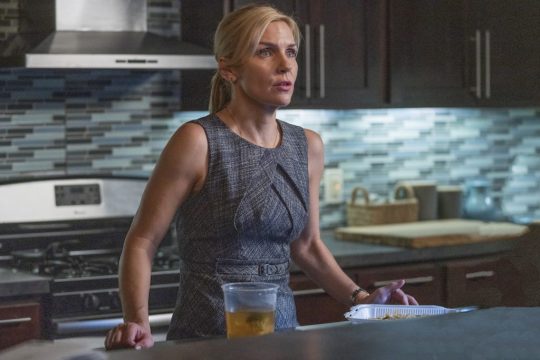
Rhea Seehorn: Who is Kim Wexler?
“I saw that something was eroding in Kim for multiple seasons.”
Awards Focus: In the season four finale, Kim was stunned when Jimmy revealed his emotional speech to get his law license reinstated was just a performance. She’s left standing in the hall as he races off to change his name to Saul Goodman.
This year, it’s Kim’s turn to leave Jimmy on his heels. Were you shocked when she left her work on Mesa Verde and subsequently started brainstorming about decimating Howard’s career to get Jimmy his Sandpiper case money?
Rhea Seehorn: Well, to be fair, it is a series of decisions. I saw that something was eroding in Kim for multiple seasons. And what I appreciate about our series, like Vince (Gilligan) and Peter (Gould) did with Breaking Bad, it’s about incremental decisions that these people are making. They’re unaware that they’re falling off a complete cliff. I didn’t know what that final scene was going to be. But I took every step that was handed to me with the information she had presently and played that scene.
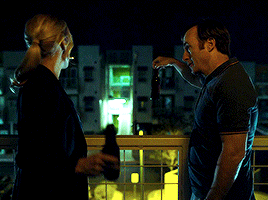
AF: You’ve said you’ve seen erosion going on in Kim, can you speak more to that?
Seehorn: The beauty of the show is that these characters are so affected by their past, not only by the events we’ve seen on the series but even before that. From the beginning of the series there was something about Kim’s stillness and her need for control and to right every ship. When I looked at that, I asked “What are you trying to get away from?” or “What are you suppressing that’s so chaotic that you need to make sure that everything is steady all the time?” Those questions spoke to me about the changes we’re seeing in the latter half of this season.
AF: So there’s a potential “Slippin’ Kimmy” underneath the Kim we’ve come to know?
Seehorn: About halfway through the season, Peter (Gould) said that he and the writers started thinking about the masks we all wear and what’s behind Kim’s mask. I will be very interested to see if she follows through with the decimation of Howard Hamlin and can she stomach those actions? Is she a person now who doesn’t even have a conscience? When she shoots the finger guns at Jimmy, there’s a menacing undertone that certainly concerns him.
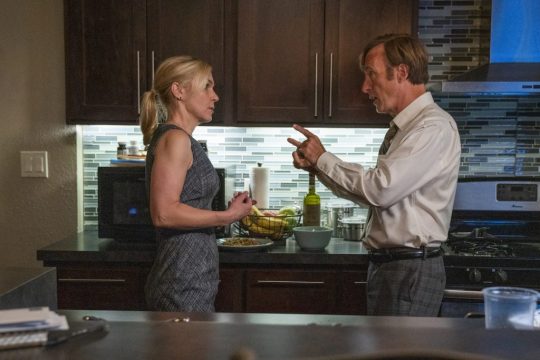
AF: There’s so many telling moments about Kim’s character. The moment when she and Jimmy are throwing the beer bottles off the roof, but Kim cleans up the glass the next morning. If Kim does goes through with this plan for Howard, do you think she would follow suit in some sort of attempt to clean up that mess as well?
Seehorn: That’s a good question. If Kim goes through with her plan, there may no way for Howard to recover. Michael Morris directed those beer bottle scenes, I love how they tie the episodes together. The first one where Kim had some animosity about her saying the name Saul Goodman and then when they’re tossing the bottles together it’s a bonding moment.
AF: Bob (Odenkirk) has spoken about living with Patrick (Fabian) and yourself in Albuquerque. Can you give our audience a look into the behind the scenes life during production?
Seehorn: The three of us have been living together for the last two years and prior to that Bob and Patrick lived together for a season without me. Frankly, I wish we’d been doing it the whole time. It’s so helpful because the scripts are so dense and complex and you’re always wishing you had more time to play with them and find new things.
AF: As you’ve pointed out, the scripts are often dense. When you have a dialogue heavy episode, how much of that preparation is just getting a grasp on the material?
Seehorn: A lot of it. Jonathan Banks and I laugh because we have the same philosophy. If you think you’re off book, then you need to ask yourself, “Are you off book riding a bike? Are you off book standing on your head? Are you off book swimming in the ocean?”
You think you know your lines and then as soon as you’re asked to do something, or you try blocking, or your scene partner decides to do whatever they’re going to do, the words start to slip away from you. There’s just no time for that with our shooting schedule, not if you want to bring your A-game.
AF: Is there a general time set aside for working through the scripts at the house?
Seehorn: If you’re having a cup of coffee in the main kitchen, you’re gonna get asked to read lines. You basically need to hide in your room if you don’t want to run lines, because if you are seen or visible anywhere in the house, you’re going to get asked. And we run lines that are not our scenes too. Like if Howard has a scene with someone else, then I’ll be whoever he’s talking to and it’s great.

AF: The scenes between Lalo (Tony Dalton) and Kim are incredible this season. Before we dive into specifics, talk about working with Tony and his presence as Lalo.
Seehorn: I mean, how great is Tony? What a find that Sherry Thomas and Sharon Bialy brought to Vince and Peter. He’s so talented, but he’s also a very generous actor. It doesn’t matter if he’s not talking for the majority of the episode nine confrontation, he’s giving me so much in that scene once I’m toe-to-toe with him.
AF: We saw a different Kim when she meets Lalo in jail. Can you talk about crafting that confrontation?
Seehorn: I spoke with Gordon Smith, who wrote episode eight, about the idea of when is Kim off her game? Because previously, we’d seen that she can fall apart in a stairwell or at home, but once she walks into a courtroom or a meeting, she suppresses all of that, and can be totally professional.
So, I went in there questioning “Do we think she can actually hold herself together right now?” We decided that she probably hasn’t slept at all and she knows this is a very scary situation. She’s pretty sure that Jimmy is dead or dying in the desert right now and she can’t call the police and tell them what happened. So, she’s trying to get information from Lalo and she’s unsuccessful in that scene whereas in episode nine she is successful.
I like that Kim got two attempts to go at Lalo using intelligence and rhetoric. The second one in episode nine, written and directed by Tom Schnauz, was a monster of a scene and we knew it.
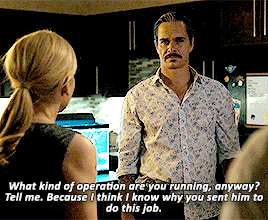
AF: What were some of the logistical considerations for the episode nine faceoff?
Seehorn: Tom came to Bob and Tony and I, and asked if we could rehearse it on set. It’s technically a difficult scene, I have the big monologue at the end, but Tony has to play a lot of different things as he’s reacting to what he’s hearing from Bob and then Kim.
For Bob, he has to repeat the same story but slightly differently, I think four times, which for an actor is very hard material to memorize because you lose track of where you are in the loop. Tom had written in purposeful nuances as Jimmy sort of devolves in his storytelling.
So we rehearsed it, and thankfully we made a lot of decisions with Marshall Adams (the director of photography) and our camera ops and lighting people. That allowed us to get ahead of the curve and give ourselves the hours that we had to shoot it instead of losing time on the technical aspects.
AF: At the beginning of that scene, you have to be very present for Bob and Tony, conveying that sense of dread and uncertainty that Kim feels. What’s going through her head there?
Seehorn: Kim is in survival mode for the first half of the scene. She’s very still, but she’s practical. I think she’s immediately thinking, “Could we jump from this balcony? Where are the knives in the house? Could Jimmy and I take him if we had to?” Eventually, she’s run out of options and is left with observing Jimmy and what unfolds in front of her.
AF: Kim knows that Jimmy is lying to Lalo and that Lalo either suspects it or knows it.
Seehorn: She knows there’s a secret involving the bullet hole in the mug, and that the secret is so great that Jimmy is literally crumbling in front of her and it needs to be protected at all cost for some reason.
AF: And then Kim steps up to the plate, which was the most harrowing moment of the season. Were you always meant to get so close to Tony, having Kim invade Lalo’s space like that?
Seehorn: Yeah, that was in the script. I spoke to Jennifer Bryan, who’s brilliant with our costumes, and I said, “Kim’s coming from work so she has her heels on… do you think we can get the shoes off in the scene?” I talked to Tom Schnauz about having Kim’s shoes off because I wanted to be even physically smaller than Lalo.
Kim switches to pragmatism in that moment, that’s her fight or flight. She wants to go toe-to-toe like she’s proving a case, finding the holes in Lalo’s story and sewing enough doubt that he backs down.
AF: Do you think Kim prepared her argument while she was sitting there, listening to Jimmy?
Seehorn: I talked to Tom about that, I don’t think she memorized this monologue while she was sitting there on the couch worried. I think she starts it and has to find it. So, we made sure we did a couple of runs at that, just letting me find it and letting me constantly control that lump in my throat because Kim can’t become hysterical.
If Lalo sees that she’s emotionally terrified or starts screaming or anything like, she loses all she has, which is trying to present a logical, forceful argument that he really has to consider. You see Lalo shush Kim earlier on the scene, so I think she’s pretty clear what the cartel would think of women screaming or crying.
AF: Prior to Lalo, Kim’s biggest confrontation was with Mesa Verde client Kevin Wachtell (Rex Linn). The property tycoon was locking horns with Mr. Acker (Barry Corbin), an elderly home owner who refused to vacate his property.
Kim, feeling sympathetic to the man’s circumstances, recruits Jimmy to represent him — a move that nearly causes their relationship to implode. I don’t think anyone saw the idea for marriage coming, much less from Kim. What was your reaction to that?
Seehorn: That was something Bob and I worked extensively on, getting that moment to feel authentic. It’s also Kim accepting Jimmy for who he is, rough edges and all. In episode nine, Jimmy can’t accept Kim’s decision to quit Mesa Verde and she calls him out on it.
AF: Knowing what we know from Breaking Bad and now El Camino, there are very few living characters in the Gene timeline that could give fans a meaningful, full-circle conversation as the series closes. Would you agree with the argument that Kim is the obvious choice for the final conversation with the Gene?
Seehorn: Honestly, I didn’t know I’d be alive this long. If I attempt to take myself out of the equation, which is super hard as an actor, I think the writers are always going to reach for the smartest ending.
Is it the most satisfying storytelling with Kim there at the end? Or is it not? I do agree with you that as a fan I want some resolution regarding Gene. Will we only get one more scene at the beginning of season six, or will it be expanded throughout that season? There’s another question for you.
Part of AwardsFocus.com’s BCS interviews [x]
10 notes
·
View notes
Photo

Hanging with Rosey (Michael Rosenbaum). Always a pleasure to see him around town and discuss the good things he's doing. If you’re a listener of podcasts be sure to check his out: Inside of You #awardsfocus #sunday #friends #concert #losangeles #westhollywood #goodtimes (at West Hollywood, California) https://www.instagram.com/p/B88qFxxD2c0/?igshid=a4ji67nen35r
0 notes
Photo
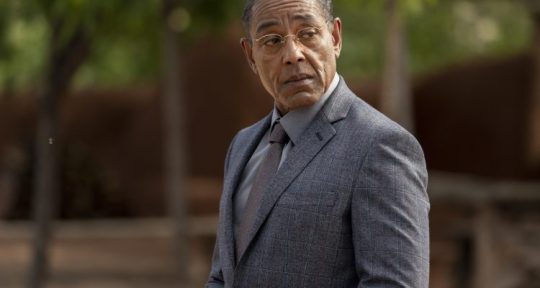
Giancarlo Esposito On Gus Fring’s Enduring Fascinations
“I think what inspired me was reading the stage direction for Gustavo Fring,” Giancarlo Esposito recalls of the duplicitous New Mexico restaurant entrepreneur. “Vince (Gilligan) wrote ‘Hiding in plain sight.’” That concise description was the doorway for Esposito into one of the most fascinating characters in television history.
Awards Focus: How did you get involved with Breaking Bad?
Giancarlo Esposito: My entry into Breaking Bad came about in a different kind of manner. I know there were a lot of actors fighting for the part. When I entered the show, I had just planned on doing a guest spot, which wasn’t something I wanted to do forever. However, I quickly realized that the filmmakers were just stellar, they make movies every week and tell incredible stories. So I was blessed to be a part of Breaking Bad and I’m blessed to be a part of Better Call Saul, and I love continuing to add to the nuance of my character.
AF: When you were offered the role, did you have any idea of the cognitive depth of the character?
Esposito: Well, the first time around, I really enjoyed doing my guest spot. And by the time I got back to New York they were asking me to do another. I said okay, because I’d had a great experience and that was the end of Breaking Bad’s second season. I’d done two episodes and they wanted to offer me a contract. I said that I really loved my experience, but I’d love to be able to talk to Vince Gilligan about some ideas I had for the role and what it really could be. I loved the character, and I saw something special there.
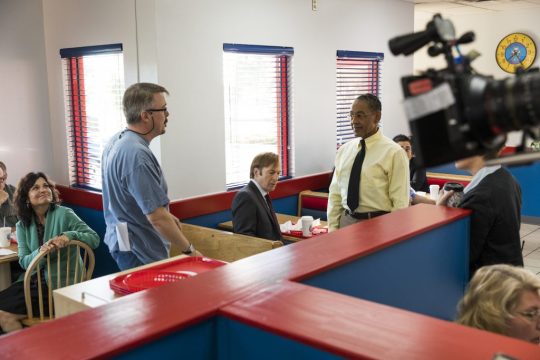
I was interested in connecting with Vince before they started writing for season three. When we eventually spoke, I knew we had the same vision for the character. I think what inspired me is when Vince wrote the stage direction for Gustavo Fring that said, “Hiding in plain sight.” That intrigued me about people in Middle America, or wherever they may be, who have neighbors who think they do one thing and may not be aware that they’re also doing something illicit… that idea fascinated me. The whole writing of Gustavo Fring, from running the drug ring to being part of the Children’s Hospital, it all made so much sense to me. When that all came about, I knew I was hooked.
AF: What challenges did that complexity pose during Breaking Bad?
Esposito: In creating Gus I had some trepidation, because I didn’t want Gus to be a Breaking Bad villain who had a minimal impact on the trajectory of the series. I wanted him to be someone who could guide a story or be involved with Walter White’s arc. I didn’t want to play the typical gangster thug with the poodle on his lap. I wanted to play someone who exhibited some humanity, who cared about people, and to create that feeling as opposed to going with the straw-man bad guy.
AF: Has Better Call Saul changed your approach to the character?
Esposito: When everything lined up for my return, I had to ask for the same kind of conversation with Vince. The challenge for me is to play a guy who’s younger, who’s trying to build an empire. Because we understood Gus’s backstory and motivations from Breaking Bad. Nothing new is revealed there, so I just wanted to show Gus developing, and that’s a challenge thing to play. Those are the things I think about while I’m playing the guy who’s laying out the card game, the guy who is really setting the pieces on the chessboard. I try to layer that personality.
I’ll give an example. At one point in season five, Gus is outside his restaurant as it burns down by his own hand. Not long after, Mike pulls up as Gus gets some bad news and he’s pissed off. A couple of months later, I’m in ADR (rerecording dialogue in post production) and I looked at my performance and noticed I was a little agitated. For a moment, I worried it wasn’t the right choice, but then I realized that I’m not playing the Gustavo Fring of Breaking Bad, I’m playing a different character.
This is the Gus Fring of Better Call Saul, who’s younger, who’s gonna be a little more pissed when his plans go awry, and who’s gonna show it. When you’re playing with time and going back in time for an iconic character that I played in Breaking Bad, I get to think about all those things that keep me balanced.
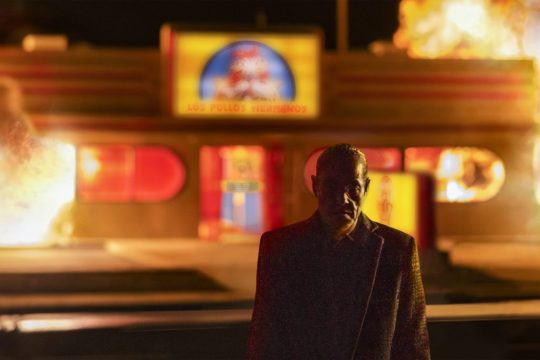
AF: Over the last three seasons, you, Peter, and Vince have been able to explore the intricacies of Gus and his empire, as well as revealing more depth in his relationship with the cartel and Mike. How has the relationship between Gus and Mike evolved over both series?
Esposito: I love those scenes with Mike. Jonathan just embodies the very soulful personality of an everyman, but he’s still an unusually skilled actor. The reason I love working with Jonathan is because while I know the overall feeling of what he’ll give me, I never know the depth he’ll take it to. Mike is a complicated guy, and I think he’s pissed off that Gus understands him. He’s very suspicious, and Gus always has to have something on you, so that complicates things, in addition to the disagreement over Nacho’s role. But Gus respects Mike, because he’s skilled. So I think it was a very tough spot for Gus – he wants to listen to Mike, but he needs Nacho on the inside.
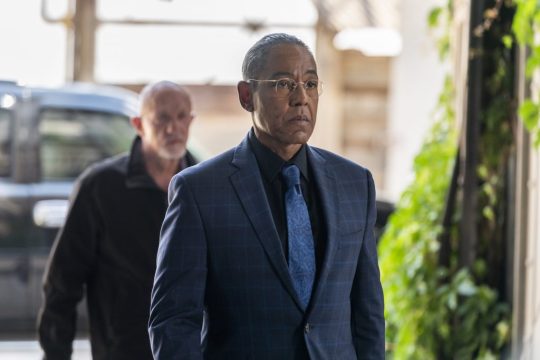
AF: A lot of fans ended up rooting for Gus. Was that something you foresaw?
Giancarlo Esposito: It was in season four of Breaking Bad when people started to really like Gus and root for him a bit. And, you know, there are arguments that he’s not such a bad guy. It was triumphant for me as an actor and as a character because if people could see the vulnerability behind the steely coldness, and understand the reasons why Gus did what he did, you can kind of accept the guy.
AF: In Better Call Saul, when Gus has to give up money at the drop locations and he’s waiting for the call in his office, that poor fry cook is not cleaning the deep fryer to his satisfaction. What’s Gus thinking at that moment?
Esposito: I love that scene because Gus is obviously up against it. He doesn’t want to give himself away by intervening with the money drop, so he’s allowing his cash to be stolen, which incenses him. So he’s waiting for the call at the restaurant, and there is this young, earnest employee. This is a part of Gus that I love, he wants to teach and he wants to get things done the right way. He gives his attention to something that may seem very small in his world at that moment, but how you do the small things, is how you do anything, and it’s how you do everything. It’s how you do the small things that make a difference in life – in caring, in loving, and in paying attention.
Gus looks at the fryer and sees it’s not as clean as it could be, and the kid sees it too. Gus wants to make it a teachable moment, and to me, if someone takes the time to teach you something, that means they care about you and the environment you share. You take the time because you respect them. And Gus, I think, admires the inquisitiveness and the honorability of people, because you know when you’ve done a good job and when you haven’t. It’s fundamentally compassionate, because it’ll help them be a better person and they’ll never forget it.
Part of AwardsFocus.com’s BCS interviews [x]
5 notes
·
View notes
Photo
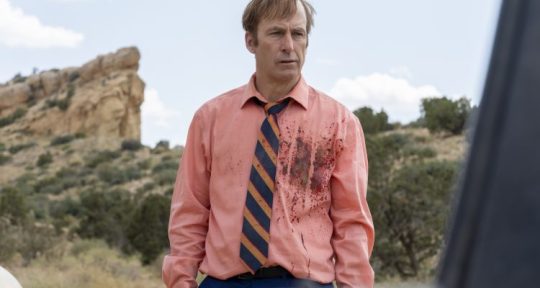
Bob Odenkirk on Naiveté, PTSD, and Kim’s Downfall
“The hardest thing for me was to play the naiveté of Jimmy as a younger person, where he starts in the series. You could say he’s become more cynical, but really, it’s self-awareness and I love that.”
Awards Focus: In interviewing your castmates, we’ve heard a lot of praise for your work. What stands out to you as a highlight for this season?
Bob Odenkirk: Well, we had a great season overall. But my favorite thing is the way Jimmy learns about himself and exhibits this sense of self-awareness. It’s great because the hardest thing for me was to play the naiveté of Jimmy as a younger person, where he started in the series. You could say he’s become more cynical, but really, it’s self-awareness and I love that. On the other hand, what he does with that self-awareness isn’t too good. He has these realizations about himself, but they give him an outlet to become ethically unmoored.
AF: Well, it’s funny because Kim, who seemed to know exactly who she was in previous seasons, looks like she’s losing herself. Does Jimmy worry that he’s opened Pandora’s Box?
Odenkirk: It’s a very strange thing, that last conversation. Because at first, you’re probably thinking that Kim’s just trying to make him feel less alone. Maybe she’s just trying to have some fun, make some gentle light out of those dark instincts Jimmy has. Or maybe she does it to make him feel a sense of his own limitations. But then those theories seem to fall flat, because Jimmy says, “Let’s slow down.” And she’s like, “No, no, no, let’s keep going.”
And she seems to genuinely mean it, to have some genuine delight in hurting Howard, who doesn’t really deserve it. Whereas Jimmy obviously pulls some crazy stunts, but those are more childish, almost like a teen prank.
AF: In talking to Jonathan Banks, we learned that he disagreed with the writers on some of Mike’s choices and he told them so. Do you have points where you’ve given the writers some pushback on Saul’s actions?
Odenkirk: Honestly, yes. There are moments where I say that “I think this is too far,” or that I don’t understand the choice. And most of the time, we’ll have a conversation where we come to some understanding on the story direction, which is to say I compromise (laughs).
After all this time, I like this character. I want him to make the right choices, almost like a friend. But sometimes the answer from Peter Gould is simply, “He’s not your friend, and he doesn’t make the right choices. That’s the story we’re telling. You don’t have his ear.”
And in the end, we know how those choices pan out. We’ve seen Breaking Bad and the road Saul takes.
AF: Yet there’s so much we don’t know, the arcs of other characters that have yet to be answered. Mike gives Jimmy a great speech about being on a specific road and not being able to get away from it. What road do you think Kim is on, going into season six?
Odenkirk: Well, I gotta say, when you see that last moment of season five, you get a glimpse at one of the core elements of the story. Because Saul is no longer asking himself who he is. Now he’s asking, Who is Kim Wexler?
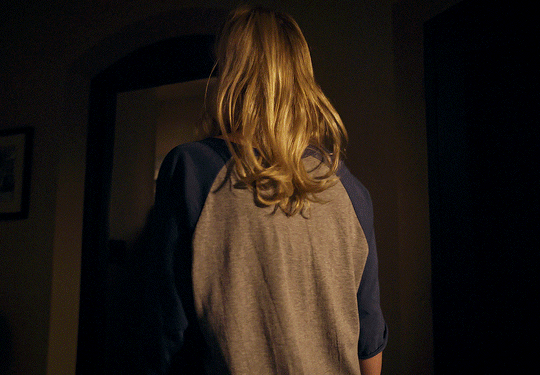
The woman who does that finger-point, gunshot gesture when asked if she’d harm an innocent man, who the hell is she? She’s done these little ethically compromised things, mostly as a team with Jimmy, with a kind of a sense of playfulness and partnership. But now there are real questions as to what’s going on in Kim’s head.
AF: The writers have certainly altered the status quo of the relationship between Kim and Jimmy over the course of season five. How do you navigate that as actors, especially in the context of broader character changes?
Odenkirk: There are definitely specific story choices and plot choices that are challenging to consolidate with the character. The moment where Kim asked Jimmy to marry her is one of those, where Rhea and I both wondered, How do we make this real? It was easier for me because all I had to do was act befuddled, which is how anyone in that situation would feel. It was harder for Rhea.
But I would say the hardest thing for me is when Jimmy’s doing a purely Saul Goodman thing, or doing something vindictive. It’s hard to understand that when you don’t have the instincts or life experience that might lead you down that road.
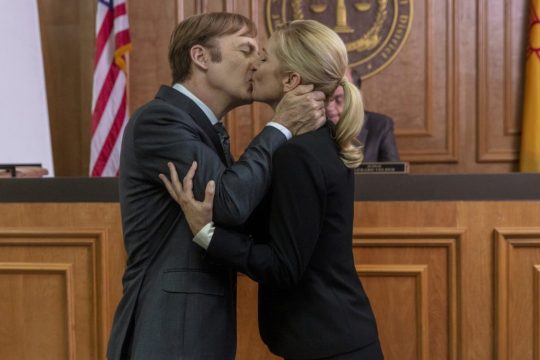
But that is a testament to the writers, they’ve given the character a sense of that now. Earlier on he would make these bad choices, and he seemed very blind to the ways in which these manipulative things would affect him and the people around him. Now he seems to understand how stuff can backfire. And he’s accepting that, moving forward with a stronger sense of realism. He’s choosing to be Saul Goodman in those moments. He’s more conscious about everything, from adopting the name to the flamboyant shoes and clothes. He’s choosing to play this role in part of his life, to give it a name, and to let that part of his spirit run rampant.
I love that development so much because the young Jimmy, he was hard to play because of his naiveté. As an actor, Saul’s self-awareness is great.
AF: In episode nine, you got to play a Jimmy who is not only physically beaten down from his trek through the desert, but also suffering from PTSD. It’s really unique to see him squirming in front of Lalo. Normally, he’d find something to say, but he’s in this weak state, and it’s just another facet you get to add to the character. The tension in that scene was incredible.
Odenkirk: Thank you. The thing is that Jimmy absolutely knows what’s happening. When Lalo says “Tell it again,” Jimmy knows he’s being played and prodded. He senses the danger, because this ploy can actually work. If you want to catch somebody in a lie, make him tell that story over and over. Jimmy knows what’s happening, but he’s too depleted to use his normal powers of logic twisting, to have the spirited energy for that kind of gamesmanship. But thank God, Kim comes through for him.
AF: Lalo’s terrifying in that scene and Tony Dalton brings so much to the character. What do you think’s going on in Lalo’s head as he listens to Jimmy?
Odenkirk: I think that was a tough one for Tony too, I imagine. You know, what’s going on inside that guy’s head who would usually just pull a gun and do it? He doesn’t care about anything.
But partly it might be that he figures he has Kim on his legal team. I mean, why not just keep her, she’s so good. If she’s got the grit and courage to give Lalo a piece of her mind, then she’s a good person to have on board.
AF: Vince Gilligan called episode eight the most challenging episode he’s ever directed. How was that experience?
Odenkirk: Yeah, filming in the desert was a brutal challenge, but even within the brutal challenge there was a kind of joy. I love when we have adventurous and physically demanding sequences. I just love it. One of the fun things about acting is going places that a real person doesn’t get to go very often. If they live their life with some degree of restraint and steadiness, it’s rare for one to find themselves lost in the desert.
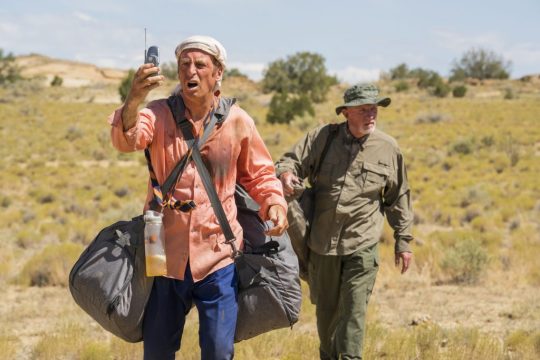
AF: During much of their desert trek, Jimmy carries two massive duffel bags filled with cash. Practically speaking, how was it acting with those for multiple days?
Odenkirk: If those bags had been filled with real money, they’d have been 75 pounds each. I don’t think I’d get that far with 150 pounds. Maybe a couple miles, which is a lot less than the distance Mike and Jimmy covered. But the bags were actually 40 pounds each, which is still very heavy. So the physical effort that shows up on the screen is very real.
AF: I’m assuming the heat was the bigger enemy?
Odenkirk: It was nightmare heat. And of course, you’re playing things over and over again. And Vince is an extremely thorough director who is shooting multiple, multiple takes from every angle. But it all worked out, because my suffering was essentially the character’s suffering. I was all for that stuff, as long as it was safe. When you have such a big crew and you’re out in the middle of nowhere with temperatures that high, it’s genuinely dangerous. It took a few days to bring in enough safety equipment to keep everybody on the crew cool. It’s definitely a bonding experience to take on something that big together and Vince did a wonderful job of shooting.
He could have made a two hour episode if he’d indulged himself with the amount of cool footage we got. But him condensing that, it was even more impactful that way.
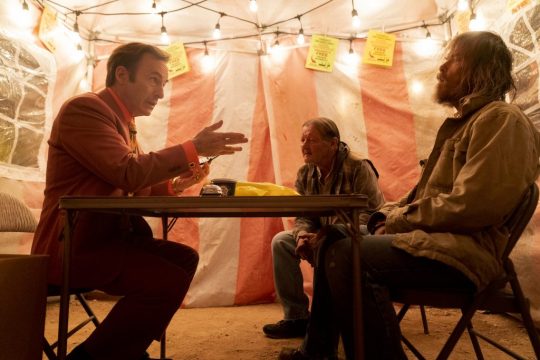
AF: This was a deeply dramatic season with some dark plots, but there was some comedic relief, like the cell phone tent scene. Is it as refreshing for you to perform those moments as it is for the audience to see them?
Odenkirk: Oh man, I have so much fun. I get really silly, and I really try to push it to the point where the writers want to tell me to pull it back a bit. But they wrote the character, and he’s a silly character, so I go with that. My trick is to go as far as I can, but try to sell it to an audience. For example, last season, I was at the grave pretending to feel at the one-year anniversary of Chuck’s death, because I know some of his law partners will come around to plant flowers and I want them to see me grieving. So I’m at the grave pretending to grieve and I’m actually saying “boohoo” as I cry. But I do it in such a way that someone approaching wouldn’t quite hear the word “boohoo.” I take these moments that the writers give me and push them as far as I can, because it’s really fun.
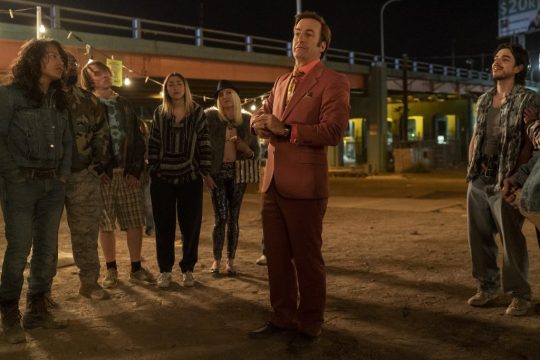
AF: One particularly funny moment featured Jimmy, a stunned Everett Acker (Barry Corbin), and a picture of a man having sex with a horse. What did you think when you read that, did you play around with various animal punchlines?
Odenkirk: No, we didn’t. It was written exactly that way and, in my opinion, it was perfect. By the way, Barry Corbin, who played Everett, is an absolutely great actor. I saw him in No Country for Old Men just the other day, and man, he’s great. I loved the absurdity of that horse picture scene. Jimmy knows how to rope in a client (laughs).
Part of AwardsFocus.com’s BCS interviews [x]
5 notes
·
View notes
Photo

Patrick Fabian: From Lord Vader to Fan Favorite
“After the finale, my social media filled up with people saying, ‘Watch your back, we’re rooting for you, Howard!’” Fabian shares. “I couldn’t help but chuckle because when the series premiered, Jimmy McGill called me Lord Vader and people immediately got on my case. Now, five seasons later, I’m almost getting sympathy.”
Awards Focus: When you’re in Albuquerque for months at a time, how does living with costars Bob Odenkirk and Rhea Seehorn affect the work on the series?
Patrick Fabian: It’s like we’re a college dormitory or a startup theatre troupe. When we go to work, we visit each other and support each other, and we’re watching and learning from our talented behind-the-scenes crew.
Then we come home and download what the day was like. I’m not gonna say we gossip, but perhaps we gossip a little bit. Then we plan for the rest of the week, even if you’re not directly involved. Oftentimes, I’m watching Rhea and Bob do their scenes.
When we do a scene, it’s more than just memorization. We talk about it, analyze it, take notes… often we’ll hit a question and then call Peter Gould or the writer of the episode to help us break it down. We’ll explore ideas before we get to set, so we’re ready to work with the director.
AF: That’s real dedication.
Fabian: To be fair, we’re home in hoodies and sweatpants reading lines over dinner or while we’re cleaning, there’s always ice cream at the end. Our living situation has worked out great and I think the proof is on the screen.
AF: Are there any scenes that particularly stand out as developing or changing as a result of your work at home?
Fabian: Well, the acting is always organic to some degree, when there’s so much drama for the actors to work with. Rhea is especially great at experimentation and reaction, so whatever you throw at her, she can throw right back. Our final scene together this season, when she tears Howard a new one, was a lot of fun. We worked that one out over the dining room table.
On the day of the shoot, I had one of those “Acting 101” moments where I just couldn’t find it. I was lost… and other actors can tell when it’s not happening for someone, we’re all sensitive to that. Rhea looked at me and said “Let’s do it again.”
I was in my head, but she encouraged me to go out on a limb. Then we did the next take and it was palpably different. She looked at me and said, “That was something,” and Peter Gould chimed in with his seal of approval. It reminded me that if we hadn’t put in the time at the dining room table, we wouldn’t have the chemistry and the trust to experiment like that.
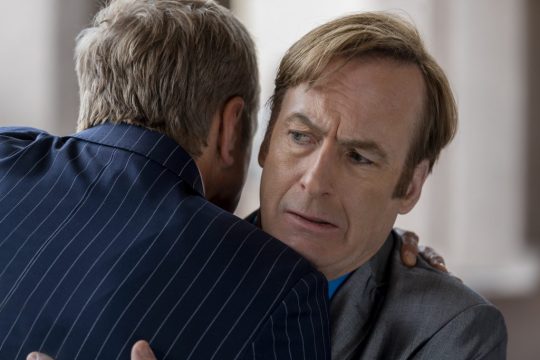
AF: In episode seven, Jimmy flies into a rage while talking to Howard in the courthouse. What went into making that scene so intense?
Fabian: As soon as I read that script, it stuck out to me as a big moment. In the context of the scene, Jimmy is – well, Saul is – unhinged. Jimmy has just seen the survivors of the kid who was killed by Lalo. He’s feeling a mixture of very unpleasant emotions. And then Howard shows up, the last person on earth that Jimmy wants to see. On a practical level, it’s funny because Bob and I are great friends and have a great relationship. Obviously, Jimmy and Howard have not had a great relationship. Howard’s coming to Jimmy after the bowling ball and the hooker incident, with one last stab at saying, “Let me help you.”
And we get this rant from Jimmy that is just unhinged. As an actor, standing there watching it, it’s so powerful. If you think that stuff is good on screen, you should have a front row seat… which I do. Watching Bob project that fury is a wonderful thing, and it’s so great to be a part of it as Howard.
Howard is coming at it with a benevolence, maybe even love. But Saul just loses it on me and calls me a “little man” and all that stuff. Howard gets to make a decision – he’s gone through enough therapy that he doesn’t have to react in kind, so he removes himself from that situation.
How we did it? Well, Bob lights the flame and he burns while the camera goes. It takes a couple of passes to get the mechanics of it correct and meanwhile, Bob is searching for his stuff. This is not a situation where I chit-chatted with Bob. He’s in a space and you have to respect that space. There’s no point in us discussing dinner when we’re doing a scene like that.
Bob did it a zillion different ways, up and down the scale, but the one we went with at the end is so wonderful. He’s yelling at me to the back of my head and you’ve got a great image of the cameras in front of me.
I’m walking out stiffly and he’s just losing his mind on me. Then the camera flips back around and it’s a silhouette of Bob after I’ve left, and Saul is just like a puppet. Like his physicality is unhinged, like you’ve got strings on his hands or something like that. And then it cuts back around to his face, and it’s wonderful.
AF: As you pointed out, Howard’s gone through therapy since his low point in season four and now he’s got a lot of momentum, personally and professionally. Season four episode six also features a Jimmy rant, with the central point being “Get yourself together!” How did that moment push Howard towards self-improvement?
Fabian: The low point for Howard is when he runs into Jimmy in the bathroom at the courthouse. Howard’s tie is disheveled – that’s how you know Howard is completely lost and adrift. But to his credit, he’s out in the world. And to his credit, he says to Jimmy, “Here’s a number that I’ve been working with. I’ve been going to therapy, this works.”
So Howard is willing to be seen like that. But later Jimmy comes into the office and tells him, “Get your shit together, Howard,” and Howard says, “Fuck you!”
By the way, AMC gets two major swears each season and they gave one to me so I felt very blessed. But back to the point, that was the turning point because Howard at that point thinks, “Wait a second, you’re right. I’m being the victim. I don’t need to be the victim.” And he works himself through it. In no small part, Jimmy’s speech boosted Howard.
AF: So a newly put-together Howard offers Jimmy a job at Hamlin Hamlin McGill. What does that represent for their relationship, from Howard’s perspective?
Fabian: Howard’s become serious about putting everything with Chuck in the past. He’s willing to admit he was wrong. And now he’s saying, “I’m hiring you not out of pity, not out of woulda-coulda-shoulda, I’m hiring you because I need you. I recognize your talents. Let’s do this.” That’s why Howard’s conscience is clean as far as I’m concerned. He’s reached out, been benevolent, and tried the best he can.
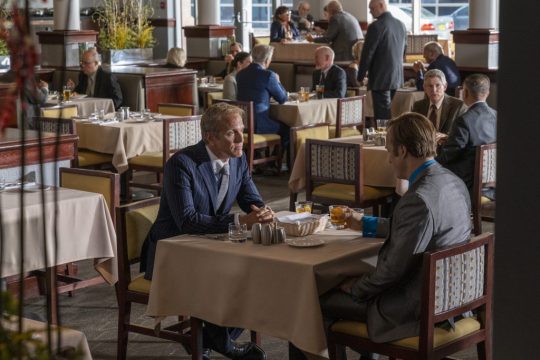
As far as hiring Jimmy, Howard knows what he’s getting, he’s not dumb. I think he’s realized that Chuck, although a very valuable asset in HHM, was not HHM itself. And so he recognizes that he has his own talents. One thing he doesn’t have is street smarts. He says as much to Jimmy – “You’re Charlie Hustle, you’re creative, you think fast.” Howard is smart enough to know that that’s not his game. Howard is good at getting business. We still haven’t seen Howard actually practice law in the entire time we’ve been with Better Call Saul. So we don’t know what kind of lawyer he is. But he knows what kind of lawyer he is. And he knows he needs a tool like Jimmy, a weapon like that in his holster if HHM is going to go places, which Howard says it is.
AF: Chuck’s influence still looms over the show. How does Howard see the relationship between Chuck and Jimmy in retrospect?
Fabian: I think Howard has been tethered to Chuck’s will from the beginning of the series. And so he tries hard to cut off Jimmy from Chuck. After it all happened, the great scene that Michael McKean and I do in his house. We have scotch and there’s an air of congratulations, because Jimmy’s gone. Howard’s telling Chuck that he doesn’t need Jimmy. And that’s also Howard in the clear, because he no longer has to play this role of being a jerk to Jimmy. Which Howard felt some resentment for, because Chuck forced him to take the heat of not hiring Jimmy. That contributed to Howard’s bold move, to pay off Chuck out of his own pocket.
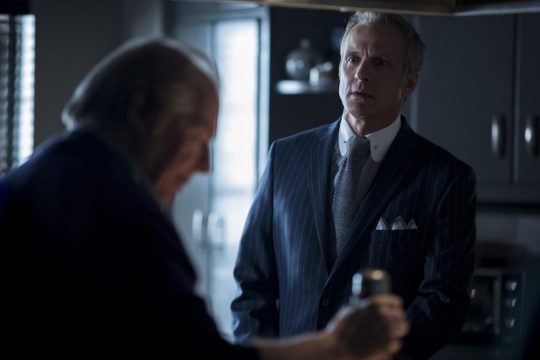
Chuck is seeping into season five’s finale because ultimately, I’m trying to appeal to Kim Wexler’s better angels. I’m trying to save her from herself and save her from Jimmy because Howard knows that Chuck’s fate was tied to Jimmy’s behavior as well. We know Jimmy is directly involved in the events that make Chuck go crazy.
So that final scene where Kim was laughing at Howard, he pulls out the only arrow left in his quiver. He washed his hands of Jimmy earlier in the season, when Howard walked away from him. So when Howard says that Chuck was right about Jimmy, it’s the meanest thing that he can say. But it also happens to be the truth. It’s like an epiphany for Howard. It’s like, “Oh, I’m done. Guess what? Good old Chuck was totally right. And I’m so done dealing with this.” I’m just a guy trying to run a law firm and all these other people are acting batshit, I just don’t get it (laughs).
AF: Jimmy accuses Howard of killing his brother. What does that line represent for Jimmy’s character arc?
Fabian: Our writers give the audience so much great stuff. So when Jimmy says to Howard, “You killed my brother,” we, as an audience, know that that’s not true. And by witnessing him saying that, we again get that pang in our heart that goes, “Ah… he’s really not going to go back to being Jimmy McGill, is he?”
We’re watching a slow motion car crash where we keep waiting for the off ramp for Jimmy and Kim. We just want them to move to Atlanta and get a house and have kids and raise horses. And yet, we know that’s not where it all goes. We don’t know exactly what happens but we know when they get to Breaking Bad, he’s full Saul Goodman.
Saul Goodman says “Kill Badger.” That’s the man he has become. So every time there’s a chance to see him not take that turn, the audience is hopeful. So when he says, “You killed my brother.” We know that’s a lie and so we don’t hurt for Howard at that point, because we also know Howard knows that’s a lie. We hurt for Jimmy and we hurt for ourselves because he’s just now embracing Saul.
AF: In the season finale, it’s not Jimmy, but Kim who seems to be heading down the dark path. What was your reaction when you learned that Kim was scheming to destroy Howard’s career?
Fabian: Of course, I’ve read all the scripts, but as an actor I’m concentrating on what Howard is doing. So I read those scenes, the dialogue that Kim and Jimmy had, back in September when we were shooting. And then the show aired in four or five months, and I watched it on Monday nights just like everyone else.
I’d forgotten exactly what that scene was and who was driving it. I think I conflated it in my brain and thought it was Jimmy coming up with another plot. So when I saw that it was Kim, it was jaw-dropping to me. Hats off to Rhea Seehorn. Because she doesn’t twist her mustache or act villainous – it’s just a slow degradation of who we thought Kim Wexler was, and maybe possibly always was.
It’s an exact flip of the ending of Season Four with Jimmy walking away saying “Saul Goodman!” And she’s standing there, and we’re left with her reaction. Now in season five, the last time we see those characters, she’s walking to the bathroom and going “Pew pew,” and we’re left on his face going, what? Even if you don’t pick up on the parallel immediately, it’s there. You saw this thing before, it was just reversed. It’s just jaw dropping.
AF: What are Kim’s motivations in that scene?
Fabian: Honestly, I don’t know. I don’t think the audience knows. Had she always hated playing second fiddle in HHM? Did she always resent Howard? Or is her moral compass just askew in general? It’s funny, after the episode, my timeline and social media filled up with people saying, “Watch your back, don’t get in the shower, be careful of your hair!” And I couldn’t help but chuckle because when the series premiere aired, Jimmy McGill called me Lord Vader, and people immediately got on my case. And now, five seasons later, I’m almost getting sympathy with messages like “Watch your back. We’re rooting for you, Howard!”
Well, that’s just the genius of the creative team. Peter Gould, Vince Gilligan, and the entire writing staff created a character who could have been one dimensional and nixed off in season two. That said, it looks like there’s something coming down the pipe for Howard. I have no idea what it’s going to be though.
AF: What about Jimmy’s motivations there? Does his hesitation emerge from guilt regarding his treatment of Howard, or to preserve Kim’s moral sensibilities?
Fabian: Oh, I think his sense of responsibility for what Kim has become is strong. Jimmy’s mentioned that several times, saying, “This is bad for you,” and “I don’t want you to do this.” And she’s always talked him into it. I mean, even the marriage thing is her idea, right?
Let’s face it, Jimmy’s sense of being able to take responsibility for his own actions has been wanting for a while. So he has a sneaking suspicion that he’s probably not good for Kim. But she disabuses him of that notion. And in the end, doesn’t Clyde want Bonnie, ultimately, to be Bonnie?
It’s a back and forth banter, and they’re viewing it in different ways. For him it’s a sort of criminal foreplay (laughs). And it is playful for her too. But those finger guns! It’s so playful, but it’s also dead serious. So we’ll see next season if they both get onboard the same train.
AF: Better Call Saul is about the masks people wear, and we’ve discussed that theme with regards to Jimmy and Kim. Is there a difference between Howard’s public persona and who he truly is?
Fabian: I like to think of Howard as somebody who is earnest and sincere. He’s certainly not a criminal, and I think his taxes would be squeaky clean. He means what he says and he’s serious about who he is. And consequently, I think it drives him. Like when he wants to help Jimmy, hereally wants to help Jimmy.
I don’t think he’s the kind of person that everybody likes. A lot of the presumptions get foisted upon him, because he’s been successful, because his father had a law firm. He’s the rich kid, the Golden Boy, and always has been. But that doesn’t mean he’s not a hard worker, it doesn’t mean he doesn’t adhere to the ideas of truth and justice. He’s shown that with his willingness to try and help Jimmy and Kim. Successfully or not, he’s worked to better both of their lives. The case can certainly be made for the things that Howard has done right in this world, only to be rewarded with being yelled at by Jimmy and laughed at by Kim.
I don’t have any indication that Howard has something hidden or a deep driving force. I don’t think of him as a dual person. Howard sleeps soundly at night with who he is.
Part of AwardsFocus.com’s BCS interviews [x]
1 note
·
View note
Photo

Enjoying a great night of music, friends...and making new friends at a special event. Had a chat with J.K. Simmons about his new projects and other cool things..he's a lot of fun. #awardsfocus #sunday #friends #concert #losangeles #westhollywood #goodtimes (at West Hollywood, California) https://www.instagram.com/p/B88Yj7HjZVM/?igshid=lgyjeoaysxcl
0 notes